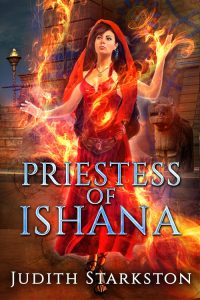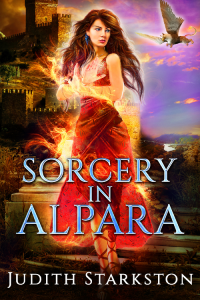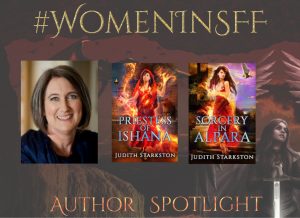Women in SFF Author Spotlight – JUDITH STARKSTON
Judith Starkston has spent too much time exploring the remains of the ancient worlds of the Greeks and Hittites. Early on she went so far as to get degrees in Classics from the University of California, Santa Cruz and Cornell. She loves myths and telling stories. This has gotten more and more out of hand. Her solution is her brand: Fantasy and Magic in a Bronze Age World. Her debut, Hand of Fire, set in the Trojan War was a semi-finalist for the M.M. Bennett’s Award for Historical Fiction. The Tesha series of historical fantasy includes Priestess of Ishana and Sorcery in Alpara. Priestess of Ishana won the San Diego State University Conference Choice Award.
Welcome to the Hive, Judith Starkston. Let’s start small: tell us about a great book you’ve read recently!
I think my favorite in recent months was Guy Gavriel Kay’s latest, A Brightness Long Ago, set in his alternate Renaissance Italy. His blend of history and fantasy challenges me in thought-provoking ways while totally immersing me into the story and world. There are two women in this book who took hold of my imagination to a rare degree, a young noblewoman assassin and a mystical healer. Through different narrators’ points of view, Kay interweaves the twin themes of memory and the role of chance in life. How often do we get to read something so smart and philosophical that’s so fun?
Okay, time to escalate things: reality warps and you suddenly find yourself leading a D&D-style party through a monster-infested dungeon. What character class are you, and what’s your weapon of choice?
I’m a sorcerer who relies on my trusty fire bolts.
When you’re not trawling through dungeons, how do you like to work? (In silence, with music, or serenaded by the damned souls of a thousand dead shrimps? Do you prefer to type or to hand-write? D’you write in your underwear, or in a deep-sea diver’s suit?)
Tell us a little bit about your writing method!
 I love to write in silence. I’m always intrigued by people’s writing playlists, but my brain needs total focus, and I don’t have a speck to spare for a musical backdrop. My desk is littered with long rambling handwritten notes where I’m thinking through scenes and exploring ideas, but actual scene writing happens on my laptop in Scrivener. Because I base my world-building and character development on the historical people and culture of the Bronze Age Hittites, I also have piles of history books and journal articles all around me with close dives into physical objects or political intrigues that I’m using to inform my fantasy. I also have thousands of photos from research travel that I refer to.
I love to write in silence. I’m always intrigued by people’s writing playlists, but my brain needs total focus, and I don’t have a speck to spare for a musical backdrop. My desk is littered with long rambling handwritten notes where I’m thinking through scenes and exploring ideas, but actual scene writing happens on my laptop in Scrivener. Because I base my world-building and character development on the historical people and culture of the Bronze Age Hittites, I also have piles of history books and journal articles all around me with close dives into physical objects or political intrigues that I’m using to inform my fantasy. I also have thousands of photos from research travel that I refer to.
I’m a plotter who regularly uses stretches of pantsing to find my way forward and keep everything in my books feeling right. I actually lay my books out on a big three-sided board and a lot of post-its—a different color for each point of view character (usually three). But the great thing about an outline made from post-its on a board is that changing course is so easy. I pull off the reject scene ideas and stick on the new ones. Words are infinitely changeable, and a writer has to believe that in her core. You can fix and improve any scene, any time. On my board, I can see how my various sub-plots and main plot are interweaving and make sure I’m not losing any threads. It helps me keep the pacing fast. I need the big overview visual of the board to keep my head from exploding. My writer friends have taken to giving me original styles of post-its because my boards are a bit notorious. Two books ago I was tracing a demonic curse thread of my plot with cute pastel butterfly post-its. I still get a laugh looking at that board. I’m all for whatever keeps a writer going in the face of that blank screen.
What (or who) are your most significant female fantasy influences? Are there any creators whom you dream of working with someday?
One of my dream creators does in fact work with me, Beth Cato. She’s written two series, The Blood of Earth Trilogy and Clockwork Dagger. She and I both live in Arizona, and we met via the Poisoned Pen bookstore. Aside from doing panels together at local cons, we’ve recently started trading manuscript reads. I am in awe of her skill as a writer, so having her input into my own work is a definitely happy dream.
Other female fantasy writers who’ve influenced my style are K. Arsenault Rivera, V.E. Schwab, and Amalia Carosella.
What was the last thing you watched on TV and why did you choose to watch it? Alternatively, what games have you enjoyed recently?
I enjoyed The Witcher. I’m always up for anything with a fantastical storyline. It suffered from some silliness with character development and confusion regarding timelines, but it was good entertainment. The hero who chases monsters and saves the “locals” from their ravages is an old Greek myth motif that keeps on dishing up good storylines.
The world shifts, and you find yourself with an extra day on your hands during which you’re not allowed to write. How do you choose to spend the day?
I love to cook and serve up a lot of good food and wine to a gathering of friends. Preparing a feast is an excellent investment of a day. I’ll be very glad when we aren’t socially distanced and kept away from each other. I need the company of friends and family. On the cooking note, I actually wrote a cookbook of the foods that I describe in my novels. When people sign up on my website for my newsletter, they get a story and down the road, also the cookbook. Ancient Mediterranean cuisine. Yum.
Can you tell us a little something about your current work(s) in progress?
This past week I sent the manuscript of the third in my Tesha series off to beta readers and my developmental editor. It’s titled (at the moment anyway) Of Kings and Griffins. The first and second books in the series are Priestess of Ishana and Sorcery in Alpara. I based the main character on a Hittite queen who was almost completely lost to history until recent archaeology dug her out. She’s a brilliant source for fantasy. On the one hand, she ruled the largest empire of her time and outsmarted her foes like Ramses II (of Biblical fame) in the realm of international politics, conspiracies, and diplomacy. Tons of plot material for epic fantasy from that part of her life. In addition, she was a priestess who received visions from the goddess of love and war, and also performed magical religious rites and protections against curses. We have the “instructions” for these practices on clay tablets. I start from that ancient structure for the magic in my books. In the second book in the series, I brought to life one of the royal symbols found in Hittite artwork: the griffin. These mythic creatures, magnificent and terrifying, play a central role in the third book that will be published this Fall.
What’s the most (and/or least) helpful piece of writing advice you’ve ever received?
Most helpful advice: Build a writer community. I could not survive as a writer without my friends. Some are close by, and I can sit across the table from them (or could pre-covid) and work out plot twists and get myself unstuck. Others are in far-flung locations, and we converse online in various ways. The least helpful piece of advice is to write only what you know. On the one hand, obviously we use the people around us as models and other aspects that we “know,” but also one of the most enjoyable aspects of being a writer is to explore topics I didn’t know and places I’ve never been. I guess in the end I know them really well before my fingers hit the keyboard, but I didn’t choose those topics because I already knew them.
Every writer encounters stumbling blocks, be it a difficult chapter, challenging subject matter or just starting a new project. How do you motivate yourself on days when you don’t want to write?
I often start my day with some exercise, swimming laps (I live in a desert so cool water is grand) or hiking. I use that time to think through a rough plan of what I’ll write about and how I’ll approach it. I find that gets me to the point where I can put words down right away. They aren’t usually the words that’ll be in the scene once I’m done, but it gets me into the movement mentally. From there I can fix what isn’t working. I never make myself write “good words.” If I know I can write horribly and that’s okay with me, I find I actually write much better than if I am constantly second-guessing myself and doubting my abilities. I already mentioned the most important motivator for me: conversations with writer friends.
 If you could visit any country at any point in history, where/when would you go, and why?
If you could visit any country at any point in history, where/when would you go, and why?
I’d go visit the Hittite queen I write about in about the year 1250 BCE in what is now Turkey in her capital of Hattusa about an hour and a half northeast of modern Ankara. I suspect the real woman was very different than the one I’ve constructed, but I’d love to meet the real deal. I’d probably never be able to write my imagined woman again, but that’s a sacrifice I’d be willing to make. Just build that time machine for me, please.
By the way, I changed the names in my fiction from the historical people to my fantasy ones. It’s clear that my novels are fantasy but not using the “real” names makes it even more immediately obvious that this is not historical fiction. Also, the historic queen had the unfortunate name of Puduhepa. That just won’t do for a hero’s name. I renamed her Tesha (which is dream in Hittite) and the Hittite Empire is called Hitolia.
Who are your favourite female characters in literature or pop culture? And do you have a favourite type of female character you enjoy writing?
I mentioned Adria, the assassin of noble birth, in GGK’s A Brightness Long Ago. She combines qualities I love to explore in fiction: unusual courage, a desire to live an unconventional life even if born into a conventional role, intelligent problem-solving, a conflicted heart that finds its way eventually to the right people to love and surround herself with. I also love a female character who can command magic that is mystical or mythic in some way. That does sum up my favorite type of character to write as well as read.
Tell us about a book that’s excellent, but underappreciated or obscure.
I’ll mention Helen of Sparta by Amalia Carosella. I’m not sure I’d call this one obscure, but it hasn’t gotten the recognition it deserves, either. It falls more into historical fiction than fantasy, but the way Carosella uses Greek myth to explore the power and limits of an iconic woman is very impressive. Her Helen (of Troy) is a refreshing break from the tired stereotypes.
Finally, would you be so kind as to dazzle us with an elevator pitch? Why should readers check out your work?
Here’s my pitch for Priestess of Ishana:
A curse, a conspiracy and the clash of kingdoms. A defiant priestess confronts her foes, armed only with ingenuity and forbidden magic.
An award-winning epic fantasy, Priestess of Ishana draws on the true-life of a remarkable but little-known Hittite queen who ruled over one of history’s most powerful empires.
A malignant curse from the Underworld threatens Tesha’s city with fiery devastation. The young priestess of Ishana, goddess of love and war, must overcome this demonic darkness. Charred remains of an enemy of the Hitolian Empire reveal both treason and evil magic. Into this crisis, King Hattu, the younger brother of the Great King, arrives to make offerings to the goddess Ishana, but he conceals his true mission in the city. As a connection sparks between King Hattu and Tesha, the Grand Votary accuses Hattu of murderous sorcery. Isolated in prison and facing execution, Hattu’s only hope lies in Tesha to uncover the conspiracy against him. Unfortunately, the Grand Votary is Tesha’s father, a rash, unyielding man, and now her worst enemy. To help Hattu, she must risk destroying her own father.
If you like a rich mixture of murder mystery, imperial scheming, sorcery, love story, and lavish world-building, then immerse yourself in this historical fantasy series. See why readers call the Tesha series “fast-paced,” “psychologically riveting,” and “not to be missed.”
Thanks for joining us today, Judith!


[…] Click here for The Fantasy Hive WOMEN IN SFF AUTHOR SPOTLIGHT – JUDITH STARKSTON […]